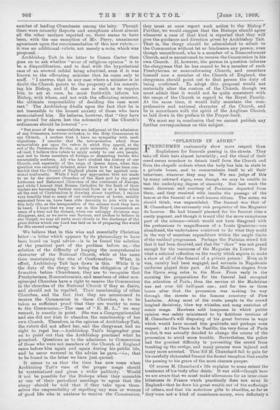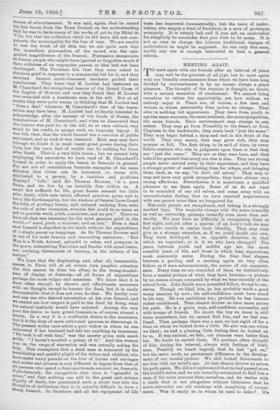"SPLENDID IN ASHES."
FRENCHMEN customarily show more respect than Englishmen for funerals passing iu the streets. They take off their hats almost invariably ; and the ritual of their • creed seems somehow to detach itself from the Churoli and from the chapelle ardente where the body has lain in state in a private house, and. to communicate itself to all theit behaviour, wherever they may be. We can judge of this' by many outward signs, even though we may be unable to test the underlying degree of sincerity. But last week the usual decorum and courtesy of Parisians departed from them, and they received with insults the passage of the hearse at the funeral of a well-known citizen. The scene, we should think, was unparalleled. The funeral was that of • M.•Chauchard, the extremely rich proprietor of the Magasins du Louvre. He hadt himself planned for his funeral rites a costly pageant, and though it is said that the more sumptuous part of the scheme—which would not have disagreed with the pretensions to magnificence of a Louis Quatorze—was abandoned, the undertakers contrived to do what they could in the way 'of senseless expenditure within the ample limits Of the residual programme. Perhaps the Parisian crowd felt that it had been deceived, and that the " show" was not grand enough for the resources of the Magasins du Louvre. But what a satirical reflection on the vanity which aspires to make a show at all of the funeral of a private person! Even us it was, cavalry had been engaged, and servants in Napoleonic Uniforms played their part. At the Madeleine singers from the Opera sang solos in the Mass. From early in the morning the preparations for the funeral had occupied the attention of Paris; then the service at the Madeleine was net over till half past one ; and for two or three hours after that the procession was making its way through the streets to the famous cemetery of Pere Lachaise. Along most of the route people in the crowd laughed derisively, blew toy whistles, and sang snatches of comio songs. Hawkers sold lampoons in which public opinion was• safely ministered to by fictitious versions of M. Ohauchard's will disposing of his great fortune in ways which would have 'earned him gratitude, and perhaps even respect. At the Place de la Bastille, the very focus of Paris in riot, it was actually decided to c'iitige the course of the procession to avoid more trouble. Nevertheless, the police had the greatest difficulty in preventing the crowd from breaking up the•corage, and many persons were injured and many more arrested. Thus did M. Ohatichard fail to gain for his carefully elaborated funeral the decent reception that awaits the passing to his grave of the most obscure pauper.
Of course M. Ohauchard's life explains to some extent the treatment of 'his body after death. It was said-though here we are aware that we must make allowances for an inter-class bitterneis in France which practically does not exist in England—that he drew his great wealth out of the sufferings of others, and. that his notorious gifts to charities, so farlie they wore trot' a kind of conscience-money, were definitely lacuna of advertisement. It was said, again, that he rented his fine house. from the Town Council on the understanding that he was to leave many of his works of art to the Hotel de Ville, but that the collection which he did leave did not com- pensate the municipality for the loss of rent. We are unable to test the truth of all this, but we are quite sure that the . immediate provocation of the crowd was the mis- guided magnificence of the funeral. Pretension exasperates to frenzy people who might have ignored or forgotten much if their criticism of an. unpopular person or idea had not been Challenged. The Parisians felt that they were asked to emulate grief in response to a commercial bid for it, and they revolted. Several mueb-diseussed incidents guided their conclusions. They knew that M. Loubet had bestowed on M. Chauchard the exceptional honour of the Grand Cross of the Legion of Honour, and now they found that M. Loubet NUB rewarded with a handsome sum in the will. But at all events they were quite wrong in thinking that M. Loubeb had "done a deal," whatever M. Chauchard's view of the trans- action may have been. M. Loubet had evidently intended to acknowledge, after the manner of the heads of States, the benefactions of M. Chauchard; and when he discovered that the honour was paid for in the will, he at once refused, very much to his credit, to accept such an improper legacy. It was felt, then, that the whole funeral was a coercion of public sentiment, and as such it was resented. Rich men may have (though we doubt it in most cases) great power during their lives, but the mere fact of . wealth can do nothing for them after death. That is a very trite lesson ; but we cannot help employing the narratives we have read of M. Chauchard's funeral in order to apply the lesson to funerals in general. Poi. are not all ostentatious funerals examples of the same delusion that virtue can be honoured, or, worse still, attributed to a person, by a tasteless and profitless display P " Life," said Sir Thomas Browne, " is a pure flame, and we live by an invisible Sun within us. A. small fire sumceth for life, great flames seemed too little after death, while men vainly affected precious pyres and to burn like Sardanapalus, but the wisdom of funeral Laws found the folly of prodigal blazes, and reduced undoing fires, unto the rule of sober obsequies, wherein few could be so mean as not to provide wood, pitch, a mourner, and an urn." There we have all that was necessary for the most genuine grief in the world,—" wood, pitch, a mourner, and an urn." Even a dead Than himself is dignified in his death without the expenditure of a single penny on trappings. As Sir Thomas Browne said in one of his most famous and resounding sentences : "But Man is a Noble Animal, splendid in ashes, and pompous in the grave, solemnizing Nativities and Deaths with equal lustre, for omitting Ceremonies of bravery, in the infamy of his nature."
We hope that the displeasing, and, after all, inexcusable, scenes in Paris will at all events turn people's attention (for this cannot be done too often) to the wrong-headed- noes of display at funerals,--of all forms of expenditure perhaps the most vulgar and senseless. We know that it is done often enough by sincere and affectionate mourners with no thought except to honour the dead, but it is easily demonstrable that it does not even do that. We hardly ever met any one who desired ostentation at his own funeral, and we cannot see how respect is paid to the dead by doing what his natural instincts would have rejected. .Among the very Poor the desire to have grand funerals is, of course, almost a nmb. In a way it ie a creditable desire in the mourners,
but it is the duty of more cultivated persons to discourage it. The present writer once asked a poor widow in whom he was
interested if her husband had left her anything by insurance. He took it all with him," was the answer given with much pride. "I haven't touched a penny of it." And this woman was on the verge of starvation and was actually asking for help. This conception that a dead man is honoured by the humiliating and painful plight of his widow and children who
bare spent many pounds ou the hire of horses and carriages
and mutes and plumes is only different in degree from that of all persons who spend a disproportionate amount on funerals. Unfortunately, the recognition that man is " splendid in
saber," and that nothing can add to the great and solemn dignity of death, has penetrated such a short way into the
thoughts of civilisation that it is actually difficult to have a cheap funeral. In furniture and all the equipment of life taste has improved. immeasurably; but the taste of under-. takers, who supply a kind of furniture, is a sort of grotesque, monopoly. It is utterly bad, and if you ask an undertaker for simplicity he concludes that. you wish to be mean. It is not so easy to change the hideous traditional designs .of undertakers as might be supposed. As one only dies once, hardly any one is enough interested to lead a general reform.











































 Previous page
Previous page